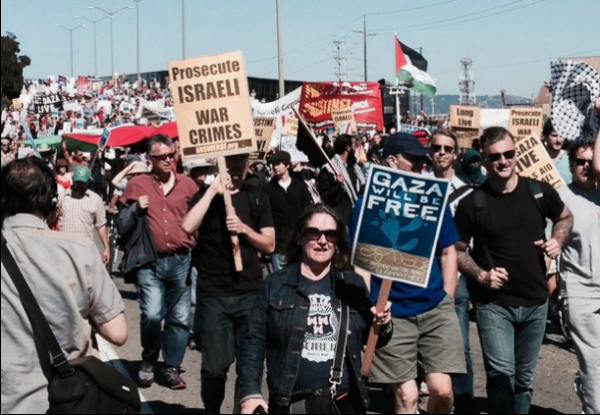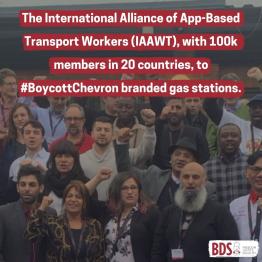Protestors block and delay Israeli ships up and down US West Coast

Over the past two weeks, activists in port cities along the West Coast of the United States staged picket lines to prevent or delay vessels operated by Israel’s Zim shipping line from offloading cargo.

Over the past two weeks, activists in port cities along the West Coast of the United States staged picket lines to prevent or delay vessels operated by Israel’s Zim shipping line from offloading cargo.
The actions had been planned at the height of Israel’s assault on the Gaza Strip that began on 7 July and ended with a ceasefire yesterday.
Zim Integrated Shipping Services Ltd. is Israel’s biggest cargo shipping company and the tenth largest in the world. It’s 2013 revenue was $3.7 billion.
The action originated in Oakland, California, which set a high bar for others to follow. Protestors there successfully prevented the unloading of the Zim Piraeus container ship for nearly four full days.
But other cities’ more modest demonstrations were nevertheless successful in temporarily delaying the Zim ships from unloading, costing the company hundreds of thousands of dollars, building momentum and signalling widespread support for such actions.
After Zim Piraeus departed Oakland on 20 August, two different Zim container ships were scheduled to dock in Tacoma and Seattle, Washington and in Long Beach, California. Weeks earlier, organizers in Oakland had reached out to Palestine solidarity groups in those cities to plan a coordinated shut-out of Zim cargo ships along the West Coast.
In Tacoma, the Zim Chicago was supposed to arrive at port on 18 August but was delayed from offloading until 23 August — which local organizer, Nada Elia describes as a victory for the Northwest Block the Boat Coalition.
Elia, a member of Antioch University’s faculty and a member of the steering committee of the Palestinian Campaign for the Academic and Cultural Boycott of Israel (PACBI), told The Electronic Intifada that the delay was partially due to a crane malfunction in Vancouver, British Columbia, but mostly due to protesters.
“The delay showed that they were trying to avoid the blockade,” Elia said. Throughout the week, activists around the state were poised — monitoring the Facebook page and then their phones for text alerts — to be called down at moment’s notice to Tacoma port for the picket. Elia said her group’s Facebook page was taken down with no explanation.
When the Zim Chicago docked on Saturday, activists rallied at the port and successfully blocked the two known entrances. But the port opened up a third, little-known entrance that allowed workers to cross the picket line and unload the containers from the Zim vessel.
The coalition that had formed around this action included Filipino group BAYAN, Queers Against Israeli apartheid and Occupy Seattle. Elia said people travelled from all around the state to attend the demonstration at the ports.
According to the Seattle Globalist, the delay cost the shipping company half a million dollars.
Limited goal
Elia said that the action’s organizers had to consider that their relationship with the longshoremen’s union in Seattle and Tacoma is not strong.
“The union’s response was, to put it mildly, not positive,” Elia said. “So we knew they were not going to be on our side.”
So they were very clear about their goal: “Our victory was determined if we were able to delay, which we very clearly did for at least three days.”
On 25 August the same Zim ship docked in Seattle and organizers were unable to prevent the workers from unloading. However, according to a press release issued by the coalition on 27 August, the ship may have delayed its arrival to the Seattle port by 24 hours in an effort to avoid the expected protests.
According to the press release, the Zim Chicago finished offloading in Tacoma the morning of 24 August, but did not begin to unload in Seattle — a port only a short distance away — until the evening of the next day, 25 August.
“We know of no other reason for the ship to wait for an open dock except to avoid spreading the impact of our blockade to other ships, who might then ask for refunds because of delays,” organizer Ed Mast states in the press release.
Getting labor onboard
Elia says that while organizers are content with the victory they set out to achieve, they hope to build their coalition: “At this point what we want to work on is getting labor on board — getting the union to realize this is an issue of social and global justice.”
Meanwhile, down the coast in Southern California’s Long Beach port, organizers were moved to mobilize an action in the span of only two and a half days after witnessing Oakland’s action.
“Oakland was so amazingly successful and it really inspired a lot of people,” Garrick Ruiz of BDS-Los Angeles told The Electronic Intifada. “We in Los Angeles wanted to do something along the same lines and that’s when the larger coalition came together.”
The coalition included American Muslims for Palestine, US Palestinian Community Network, International Jewish Anti-Zionist Network’s labor division, Global Women’s Strike, Jewish Voice for Peace – Los Angeles, Al-Awda (The Palestine Right to Return Coalition), ANSWER and BDS-LA.
Ruiz said that his group had done an informational picket on 13 August to gauge support of the action among the union, build a relationship with the rank and file members and provide information about the Palestinian General Federation of Trade Union’s call for US labor solidarity with Palestine and the efforts to blockade the Zim lines.
Ruiz said that the union as of now has been unresponsive to his group’s attempt to reach out by phone, mail and email.
But it wasn’t until the Oakland success that they decided to stage a picket line: when the Zim Haifa docked on 23 August in Long Beach, around 250 people rallied at the port until a union official sent workers for the morning shift home.
“We see this action as an important piece for building our movement, planning bigger actions and building solidarity with labor at the ports,” said Ruiz.
“In the big picture we called that demo in less than three days and everyone in that coalition put in an immense amount of work to make it happen. Now we’re stepping back to determine next steps.”
Ruiz said members of the coalition plan to attend a Labor Day parade on 1 September in Wilmington, Los Angeles to reach out to the ILWU and Teamsters unions.
And while the protests had been a direct demonstration against the devastating attack on Gaza, organizers are hoping to maintain pressure on ports and businessescontracting with Zim.
The movement to protest Zim is catching on in more cities. As a tool for activists and organizers, a new pastebin has been created that provides crucial information for tracking the activity of Zim vessels at various port cities across the US. There activists can see when and where Zim will be docking in their city.
Next up: a protest at Florida’s Tampa port is planned for 30 August.




